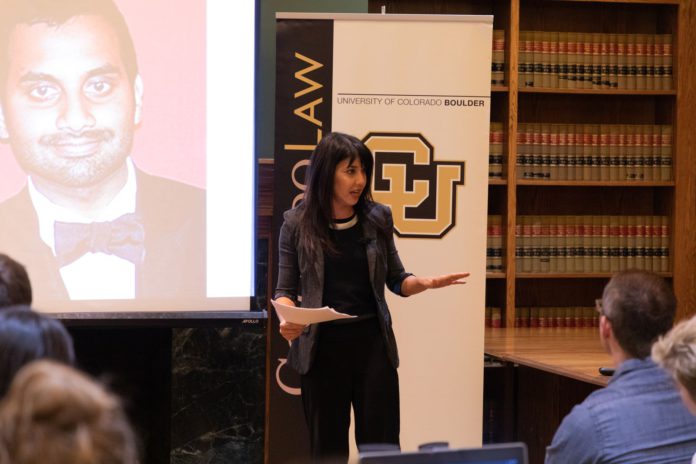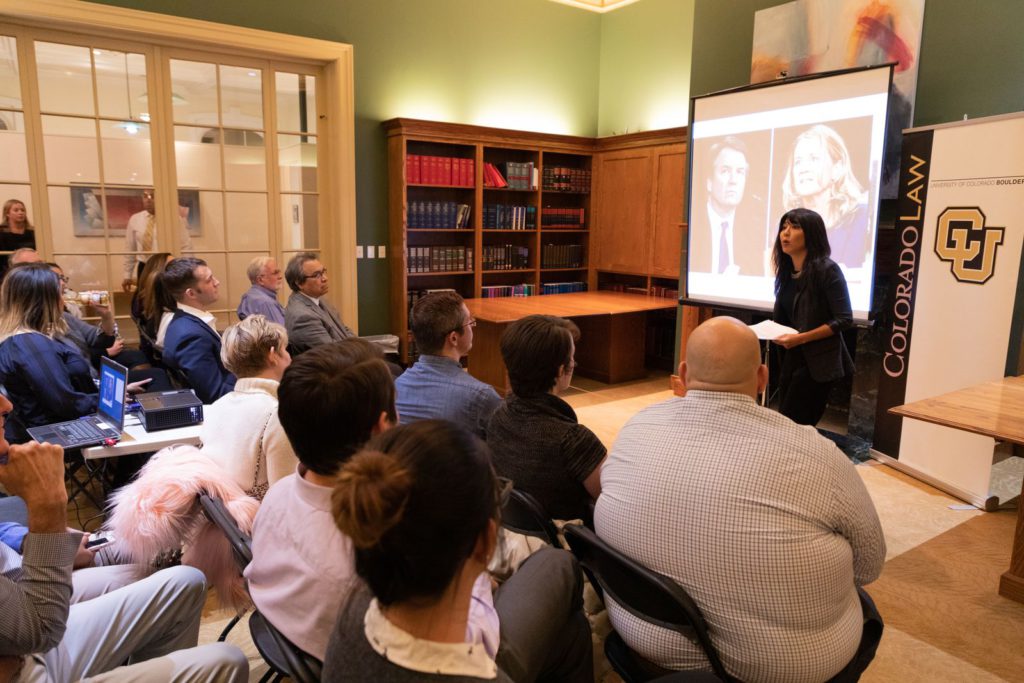
A seeming tension exists between millennial attitudes toward sex: There’s an irreverence toward casual sexual activity, yet the #MeToo movement has spotlighted a disconnect between expectations and reality of sexual encounters. But as CU Law Professor Aya Gruber sees it, the tension isn’t a result of a generation’s incoherence in its attitudes.
It “reflects contemporary feminists’ struggle to embrace sexual liberation, while simultaneously critiquing a schizophrenically regulated sexual terrain, where all the burdens seem to fall on women,” Gruber said during a lecture Wednesday evening. Her talk was part of the Colorado Law Talks series centered around the intersection of law and top-of-mind current issues, such as free speech, race relations and this time, shifting understandings of sexual consent.
Much of Gruber’s talk focused on the tangles created by affirmative consent, a legal approach to tackling sexual assault that, despite intentions, has assumptions built into it that might ultimately raise more questions than it resolves.
Laws in about 22 jurisdictions and in school policies that require affirmative consent to sexual activity often define it as voluntary, enthusiastic and ongoing agreement to the activity. But Gruber said she has found affirmative consent proponents she talks with haven’t actually thought much about what the “consent” part can look like, beyond a clear and unambiguous “yes.”
Gruber said the assumption that affirmative consent has to involve an actual “yes” can lead to both over- and under-criminalization of sexual activity: under-criminalization when getting the affirmation involved coercion, and over-criminalization if it doesn’t take into account the other forms consent can take.

“Within this very complex struggle, what we had was legislators and college administrators come in with their language of the law,” she said. “With their language of perpetrators and victims, of criminal guilt and innocence, and impose from above a morally polar framework that simply does not capture the contemporary debate over sex.”
Another assumption built into the affirmative consent concept that can prove problematic when it’s not true is that a person’s external signals about whether they consent will always accurately reflect the internal decision they’ve made about whether they want the sexual activity in question.
From a legal standpoint, such assumptions can turn a participant into a perpetrator when they have to interpret the other person’s external cues.
The fact finders in a case then have the task of making a decision about which person has a stronger argument — the person who said they didn’t actually consent, or the person who said signs pointed to the other wanting the sexual activity. This type of situation has often also had the effect of putting victims on trial.
“So when you try to make linguistic rules like ‘No means no, it’s very hard to do,” Gruber said.
She highlighted the difference between jurisdictions that use an affirmative consent legal standard and those that do not. Under an “ordinary consent” standard, Gruber said, all external factors can be looked at to analyze whether there was consent.
“Affirmative consent’s intervention is deliberately made to narrow that world to a much smaller world of manifestations,” she said.
The importance of considering all contextual factors that may point to consent or a lack of it are seemingly well illustrated by allegations of sexual misconduct by a woman against comedian Aziz Ansari during a date, which went viral in January after they were published in a piece on then-unknown website Babe.net.
The woman, who went by the pseudonym “Grace” in the story, told writer Katie Way her statements to Ansari about wanting to slow down and not wanting to feel forced, as well as her body language, should have sent a message of non-consent.
The affirmative consent standard is further complicated, Gruber said, by murkiness surrounding the requirement to consent to each specific sexual act.
She explained tangles exist from both practical and legal perspectives. “You can’t have an ongoing verbal expression of consent, what would that even sound like?” she said. “You probably epistemologically can’t have an ongoing internal consent. That doesn’t even comport with psychology.”
From a legal angle, Gruber called a requirement for ongoing affirmative consent a “multiplicity problem.”
“Those of you who are criminal lawyers know the multiplicity problem,” she said. “What act? … And which is consent to it?”
To cap off the legal snafus raised by an affirmative consent approach, Gruber said social research seems to suggest it just doesn’t match up with actual common behavior. Surveys have shown a disconnect, she said, between college students defining consent as “yes means yes,” but also describing sexual encounters that didn’t involve an explicit “yes” as positive experiences.
“Anybody can say yes means yes, but the social science tells us people don’t practice yes means yes, especially young people.”
— Julia Cardi

